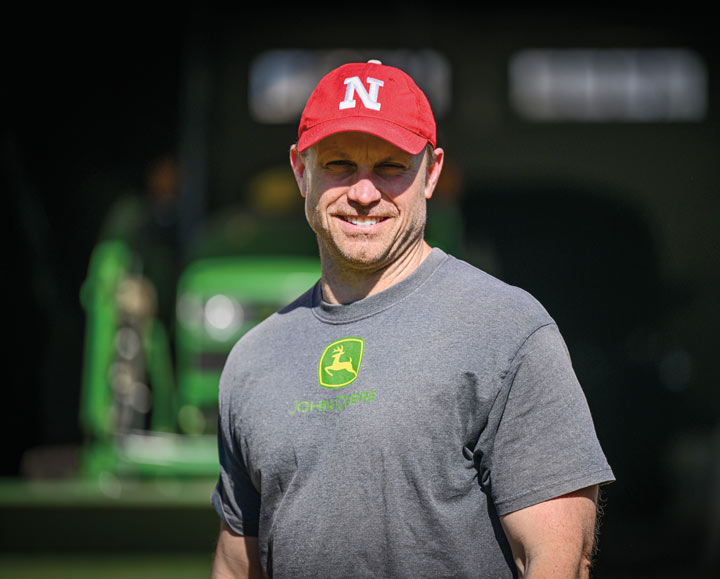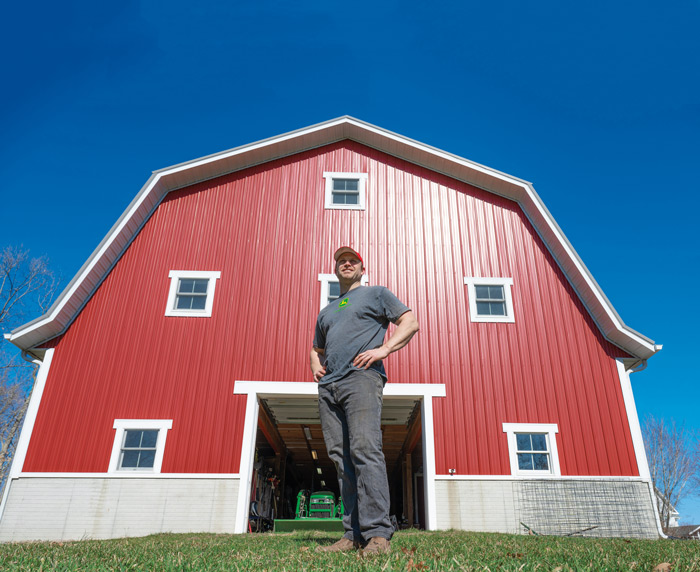OUTSTANDING IN HIS FIELD
“Farming isn’t work to me. It’s just being back home.”
For five days every fall and every spring, Brad Badertscher, the Deloitte Professor of Accountancy, can be found not in his classroom or Mendoza office, but atop a John Deere 8100, cruising the rows of his farm in Nebraska. Farming is not a hobby for Badertscher, but a deep part of his heritage and possibly even his soul.
When I was 10, my mother gave me and my two brothers, Tony and Mark, one firm piece of advice: “Don’t ever become a farmer.”
But we all wanted to be farmers. Both sets of my grandparents and great-grandparents were farmers, just outside of Tecumseh, Nebraska. They grew mostly corn and soybeans, but also raised cattle and pigs. It’s where I grew up, and driving a tractor, feeding the livestock, fixing fences and “walking beans,” were part of my daily life.
 When I go back now, I particularly enjoy climbing to the top of the grain bin to look out across the wide-open field. Knowing that my father and grandfather worked this land it connects me to them in ways that only the farm can do. It feels like I am now the caretaker of something they spent their lives caring for and that is a significant responsibility and a privilege.
When I go back now, I particularly enjoy climbing to the top of the grain bin to look out across the wide-open field. Knowing that my father and grandfather worked this land it connects me to them in ways that only the farm can do. It feels like I am now the caretaker of something they spent their lives caring for and that is a significant responsibility and a privilege.
We all loved working the fields with our dad. Both sets of my grandparents lived right down the road. You talk about a community — you had to have multiple generations to be able to farm because you needed the help.
But my mom had good reasons for her advice.
Farm life is never easy, but those times were particularly challenging. The 1980s are known as the period of the farm crisis in America. It was brought about by a confluence of several bad strokes of fortune — failed government policies, commodity price volatility, high interest rates and inflation, debt taken out on the land that farmers couldn’t pay back and two major droughts.
John F. Kennedy provided one of my favorite quotes about farming and the ability to make money: “Farmers buy everything at retail, sell everything at wholesale, and pay freight both ways.” He was right, and the events during the 1980s caused many farmers to lose their livelihoods.
In 1988, the year of the second major drought, my father was forced to sell and we lost part of the farm. This weighed heavily on my family and, despite the fact that I offered to chip in all the money in my piggy bank, the family farm was not coming back. At least, I didn’t think so.
My brothers ended up working for local John Deere dealerships, but I was the oddball who ultimately went into academics. I wanted to go to a four-year school, so I earned my bachelor’s degree at the University of Nebraska-Kearney and eventually my MBA and Ph.D. at the University of Iowa. Obviously, this path led me to different places. I lived and worked in Des Moines, Iowa and Minneapolis, Minnesota before deciding to become a professor.
But I’ve always gone back to the farm. Although my real job is as an accountancy professor, I find so much value in getting my hands dirty, working the soil, cultivating and growing something so tangible and close to the earth. It reminds me that my grandparents were not just farmers; they considered themselves stewards of the land. That’s a big responsibility.
One of the few things my grandfather ever hung on his wall was a conservation award he was given by the State of Nebraska’s Soil and Water Conservation Board. He was so proud of the recognition because he took the idea of stewardship very seriously. He was an early adopter of many conservation practices that are now standard and served on the local conservation board for many years. I now proudly display his award on my office wall.
There are lessons in farming about the value of land and family, of heritage and continuance. And, as my mother knew, there are some hard lessons, too. Farming today is extremely capital intensive. That’s why there are fewer and fewer family farms. It takes at least 500 to 700 acres to support a family. The average price of top-rated farmland in Nebraska and Iowa is probably about $10,000 to $14,000 an acre. That’s over $5 million just to buy the land, if you could afford it — which you probably can’t. Finding a bank willing to lend that much capital is difficult. Most likely, farmland has to be passed down from prior generations. The only way to sustain a family farm is by thinking multiple generations ahead.
It’s not like a stock. I mean, if you own Google stock, you can sell it and get your cash. Farming is a completely different mindset of investment. It’s not just a singular transaction to invest. It’s a transaction for multiple generations. You want to continue the investment started by the generations that preceded you. It is a much longer vision of life and of stewardship that you do not realize in other assets you acquire.
 You buy and sell a car or a house. But land, to me, also has a value you can’t put a price on. I can’t, anyway. I buy the land to use during my lifetime, knowing I will pass it along to my children to do the same during theirs. I share this perspective with my students because I think it’s important for them to understand that not all investments should be based on a “positive net present value” calculation. For me, it is difficult to measure the feeling of being connected, through multiple generations, to the land. It has value that cannot be measured. I have no doubt that my students will experience something similar in their life.
You buy and sell a car or a house. But land, to me, also has a value you can’t put a price on. I can’t, anyway. I buy the land to use during my lifetime, knowing I will pass it along to my children to do the same during theirs. I share this perspective with my students because I think it’s important for them to understand that not all investments should be based on a “positive net present value” calculation. For me, it is difficult to measure the feeling of being connected, through multiple generations, to the land. It has value that cannot be measured. I have no doubt that my students will experience something similar in their life.
My parents-in-law, Boyd and Deb Campbell, farm about 1,500 acres in north central Iowa. Their biggest concern in life right now is, how do they pass this on to the next generation when none of their kids farm? It’s deeply important to them to continue the legacy created and passed down by Boyd’s own grandparents and parents. They’re hoping that someday maybe my children or grandchildren want to farm. They know that if you sell the land, you’ll never get it back.
Well, hardly ever.
In the summers of my high school and college years, I worked for the guy who bought my family’s farm when we were forced to sell. He was a local farmer and businessman who owned a number of farms in the area. When he decided to retire in 2012, he put the farm up for auction. When I heard it was for sale, there was no doubt in my mind — I was going to buy it.
I was in my office at Mendoza talking with my dad, who was bidding for me as it was being sold. With every incremental bid, my heart beat faster.
Finally, we won the auction. The farm returned to my family, who had owned it since 1937. It was a particularly special feeling for myself but I was especially elated for my dad to be part of the process of buying the farm back.
Today, my two brothers do the majority of the work. I go back every fall break to help harvest. Every spring break, usually in March, I return to help with planting. I pull my kids out of school to go with me when I can. I’ll pass the farm to them when it’s time. I want them to experience what I do when I work the same land that my father and grandfathers did.
Farming isn’t work to me. It’s just being back home.
Brad Badertscher is the Deloitte Professor of Accountancy. As of July 1, 2022, he will become the Deloitte Foundation Department Chair of Accountancy at Mendoza College of Business.

Comments